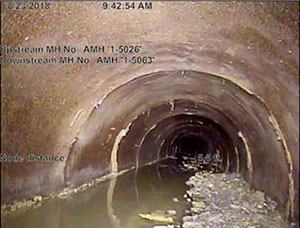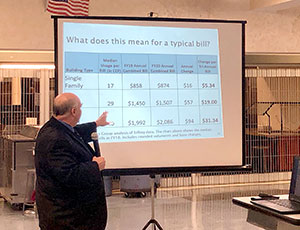
Freeze frame of video inspections of sewer pipes in the Davis Square area. The inspections, which covered 6.8 miles of pipes, identified at least $3M in needed repairs.
By Denise Keniston
At a public hearing on Monday, April 22, in the Somerville High School cafeteria, while rain pounded down outside overflowing the outdated water and sewer system, Director of Water and Sewer John DeLuca presented – and tried to sell residents on – the “critical need” for a 6% water bill increase and a 7.5% sewer increase. The increase goes into effect on July 1 and will finance surveys, inspections, and repairs- all part of a capital improvement plan.
“We can’t keep kicking the can down the road. We can’t keep fixing and doing repairs caused by many things, even heavy rains like we see tonight,” DeLuca told the few residents in attendance. “Sewer and water repairs are expensive, and we can’t wait any longer. We have to have a plan, and that plan needs funding.”
DeLuca is referring to the water/sewer capital improvement plan; 10 years long and costing $293M. The first three years focus on “maintaining the crumbling and dilapidated septic system, replacing clogged and corroded underground pipes that are failing, and investing aggressively in the system to make sure it’s compliant with a strenuous regulatory environment.”
Specifically, and by way of an example, DeLuca refers to a recent project in Davis Square where an industrial, high-pressure vacuum blasted and sucked out ten truckloads of debris clogging the pipes buried under the pavement. “That’s just one example of many, many similar projects citywide that need to be done,” says DeLuca. “The sewer pipes beneath the pavement at Davis Square were so corroded we had to do something, now.” DeLuca adds, “The Davis Square pipe clean-out represents only 6% of what’s needed citywide. We’re only just beginning.”

Director of Water and Sewer John DeLuca explains water and sewer rate increases, referring to Somerville’s water and sewer system as being in “critical” condition.
Funding will come from only two sources: sewer and water bills, as well as inflow and infiltration fees (known as an I&I fees assessed on all new construction in the city), until the city council approves a series of future bonds.
Meanwhile, the lion’s share of funding falls on Somerville residents, hence the increase in sewer and water bills. Estelle McDonough has owned and managed a 3-family home for 40 years and is part of a shrinking “old guard” of residents who attend such public hearings, their voices growing fainter and fainter.
“People who’ve lived here all their lives are being forced out,” says McDonough. “We’ve invested our entire lives in Somerville and now add these sewer and water bills – which net out to be a 40% increase over a year’s time – with the 16.3% property tax increase and it’s enough to cripple families and long-time residents.”
Homeowner Danny Sullivan is frustrated. The public hearing, he says, is just a formality. “The city is gouging us. We’re getting whacked left and right,” says Sullivan. “It’s just bills, bills, bills. What about these big developers? Why aren’t they paying their share? Pretty soon even the old, long term residents will be priced out. Then you’ll have only the rich and people on public assistance living in Somerville, no middle.”
Somerville is one of a few cities around Boston proper with a combined sewer and water system. Raw sewage and wastewater flow together through the same underground piping system, and toxic overflows often seep into the Mystic River Watershed and Alewife Brook Reservation. The EPA has stepped up its pressure for maintenance and updates which, if not implemented, could result in fines and other penalties. “The last 5-7 years of the plan will focus on separating the sewer and water lines,” says DeLuca. “We need to do this for environmental reasons and to do our part in protecting our natural resources.”
City Councilor William A. White is chair of the Public Utilities and Public Works Committee and has already reported back to the City Council as a whole. “We’re looking at bonding phased in over several years to separate our combined water/sewer system that is potentially polluting our precious waterways,” White says. “It’s [the sewer/water system] archaic and unhealthy and environmentally toxic. We can’t wait any longer to tackle this problem.”
Capital Improvement Projects compete with each other for funding and resident support, including visibly pleasing projects such as city parks, which by comparison are far more glamorous than the lowly sewer/water underground systems. “People tend to take fresh flowing water for granted. You expect when you go to your kitchen tap water will flow out,” says DeLuca. “When you flush your toilet it works. But no one actually ‘sees’ the system working. It’s out of sight, out of mind.”
Technically, Somerville’s City Council still needs to pass the increases. But, residents can realistically expect to see the jumps in their bills starting July 1, 2019. Residents who were not able to attend Monday’s public hearing can email John DeLuca directly for the next five days through the general commentary period. You can email Mr. DeLuca directly at water@somervillema.gov or by mailing a letter to the Water Department, 17 Franey Rd., Somerville, MA 02145.















I can’t believe they are seriously going to raise water and sewer rates by 13.5%. On top of the already outrageous water/sewer rates, the rise in property taxes, the coming costs of the green line, the new high school, and the new alternative high school. How do they think people can absorb this into their budgets?
The easy part is we are going to have to pay or leave. They have plenty waiting to come in a take our places.
A 6% increase and 7.5% sewer increase is not a 13.5% increase. If both bills were for equal amounts, it would be a 6.75% increase. No matter what, the total increase would fall between 6% and 7.5%. Anyone who lives near Union Square should understand why we’ve got to upgrade the system.
It’s a lot to take in, for sure, and it will impact all of us. But having a good, well-maintained water system is vital infrastructure — it’s not just “quality of life”, water is life itself. This is the right thing to do. We don’t want to turn into Flint.
enough is enough